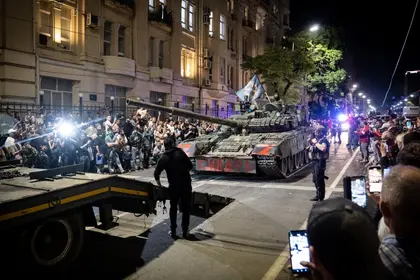With the Wagner private military company (PMC) failing in its “March on Moscow” last weekend, and its leader bound for apparent exile in Lukashenko’s Belarus, the questions arise of whether the mercenary group will be disbanded, incorporated into the regular Russian forces in Ukraine, or separately continue its operations in Africa and the Middle East.
On Monday, Russian dictator Vladimir Putin tried to persuade Wagner fighters to join the Russian military and continue fighting against Ukraine. Yevgeny Prigozhin, leader of the aborted Wagner mutiny, attempted to downplay his armed rebellion to protect himself from accusations of attempting a coup against Putin.
JOIN US ON TELEGRAM
Follow our coverage of the war on the @Kyivpost_official.
Putin confirmed his view that “the overwhelming majority” of the Wagner company are Russian patriots. “By turning back, they avoided further bloodshed,” Putin exclaimed.
He went on to say that he will keep his promise to those from Wagner who had not shed blood that they are free to sign a contract or move to Belarus, thus implying an intention to intending to shut down Wagner.
Western powers believe the Wagner group is used to promote Russia’s influence abroad and have accused the group of torture and exploiting natural resources which, if done with the Kremlin’s acquiescence, gave Putin plausible deniability.
While the form of its future role in Ukraine is still under question, the Wagner group will likely continue operations elsewhere promoting Russia’s interests in Africa and the Middle East.

Moldova Residents Caught in the Middle of Gas Fight
According to AFP: “The Wagner mercenary group will continue operations in Mali and the Central African Republic despite its leader’s aborted insurrection over the weekend, Russia’s foreign minister Sergei Lavrov said on Monday, June 26. Wagner members ‘are working there as instructors. This work, of course, will continue,’ he said.”
“Lavrov said Europe and France, in particular, had ‘abandoned’ the two African countries, which had, in turn, asked Russia and Wagner to provide military instructors and ‘to ensure the security of their leaders’,” AFP added.
The Wagner Group first became involved in Ukraine in 2014 supporting pro-Russian separatist DNR and LNR forces in the Donbas area of Eastern Ukraine.
According to the BBC: “At that time it was a secretive organization, operating mostly in Africa and the Middle East, and is thought to have had only about 5,000 fighters – mostly veterans of Russia's elite regiments and special forces. Since then, it has grown considerably.”
In January the UK Ministry of Defence estimated that Wagner had 50,000 mercenaries fighting in Ukraine. At that time, the US National Security Council said about 80% of Wagner’s troops in Ukraine had been recruited from prisons.
Bakhmut likely reduced those numbers significantly during the intervening months in the so-called “meat grinder.”
Since 2015, the Wagner Group mercenaries have been fighting alongside Bashar al-Assad’s forces in Syria. In Libya, they also support the forces loyal to General Khalifa Haftar, specifically by planting landmines and other improvised explosive devices in and around the Libyan capital, Tripoli, according to the United States military.
In addition to fighting on the side of authoritarian despots and its alleged war crimes throughout Ukraine, Africa and the Middle East, Wagner provides security services for oilfields in Syria and gold mines in Sudan. And the Central African Republic (CAR) has asked Wagner to provide security for their diamond mines.
Although mercenary forces are technically illegal in Russia, the Wagner PMC registered as a company in 2022 and opened a new headquarters in St Petersburg.
Last week during the uprising, Wagner chief Yevgeny Prigozhin confirmed that Russia’s security service raided the Wagner HQ in St Petersburg, where reportedly they seized around $48 million in cash found inside a van and two buses. Prigozhin claimed the money belonged to the mercenary group.
Now, Prigozhin will supposedly move into exile, at least temporarily, in neighboring Belarus as part of a deal to end his rebellion.
Money talks louder than words
The plot thickened on the afternoon of Tuesday, June 27 when President Putin, speaking after his earlier speech outside the Kremlin, announced that Wagner had received roughly $1 billion in funding from state coffers since May 2022. This contradicted previous denials of any links between the Russian state and Wagner, but Putin said “the upkeep of the entire Wagner Group was fully provided for by the state.”
Some commentators believe Putin has tolerated Prigozhin’s antics for so long because he needed him and Wagner, not only for the group’s military prowess but for their usefulness in keeping the military hierarchy off balance. He has long viewed the ministry of defense as a potential threat to his rule, which may explain why he keeps Shoigu in post in spite of accusations (and demonstrations) of his incompetence. Wagner’s high-profile role has as much to do with Moscow power dynamics as its success on the battlefields of Ukraine, the Middle East and Africa.
So, what does this all mean? Was it a straightforward falling out between the Tsar and his protégé, who just got too big for his boots or just got tired of his troops dying for little purpose? Is there a more complicated game going on?
The reality is Putin needs Wagner and Prigozhin or someone like them to do his dirty work and may be casting an eye around to replace them or move them under new management.
In the meantime, “Putin's chef” should avoid ice picks in the kitchen and rooms on the upper floors of hotel and apartment blocks.
You can also highlight the text and press Ctrl + Enter










